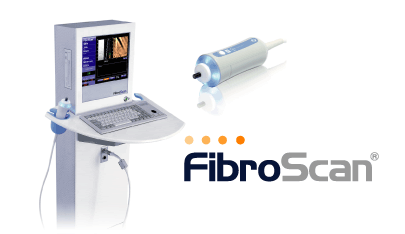
A FibroScan® test is a quick (15-30- minute), painless, non-invasive examination of liver health, and provides a painless and reliable alternative to liver biopsy. The test measures liver health by measuring liver fibrosis or scar tissue in the liver, and additionally measures the amount of fat in the liver using the new Controlled Attenuation Parameter (CAP) assessment. Liver Wellness® is the first clinic in the private sector to offer the test to patients with the FibroScan® 530 device.
Blood tests and clinical examination cannot reliably diagnose liver cirrhosis, and traditionally the only method to assess for liver scarring was a liver biopsy, which is invasive and can be associated with complications. Additionally, a liver biopsy requires hospital admission and several hours of bed rest after the biopsy. However, early detection of liver fibrosis is important as it allows both the patient and the doctor an opportunity to plan treatment and intervene before cirrhosis (irreversible liver scarring) has developed. Using the Fibroscan® 502 device, Liver Wellness™ can routinely provide this test to all patients who have chronic conditions of the liver, and can be repeated regularly (e.g. every 6-12 months) without any health risks. This provides very important information to both the patient and the doctor in monitoring the progression of a particular liver disease. For those patients who previously underwent treatment and want to determine that the liver is returning to a healthy state, Fibroscan® examination can provide information on how successful the treatment was.
-
- You will lie down on your back and with your right arm raised behind your head.
- The doctor or liver nurse will apply a small amount of gel to your right side of your abdomen and place the probe with slight pressure against your skin.
- Ten consecutive measurements will be made at the same location. The device will measure the state of the liver globally, as opposed to a biopsy, where only a very small sample is measured.
- The test takes about 10 minutes, and the result is delivered immediately at the end. It will be a number between 1.5 and 75 kPa.
- The doctor will evaluate and interpret the results and your report with recommendations will be completed within 72 hours and sent to you, your referring specialist or GP.
This includes the examination, performed by a specialist nurse, review of the results and reporting of the results with recommendations to the patient and the relevant health care practitioner by Prof. Suzanne Norris, consultant hepatologist.
A FibroScan® is recommended for patients with:
- abnormal liver blood tests
- risk factors for chronic liver disease
- staging of liver disease in patients with hepatitis C
- staging of liver disease in patients with hepatitis B
- patients with a diagnosis of fatty liver
- family history of liver disease
- patients who are worried they drink too much alcohol
- patients who have type 2 diabetes
On your arrival to Liver Wellness™, you will be asked to fill in a form (name, address, referring doctor). You will be asked some medical questions regarding your liver condition. You will be examined with the FibroScan®. Your FibroScan® test results will be provided and interpreted by the consultant liver specialist and your report completed within 72 ours of your visit.
No you don’t need a referral. You can call us on 019108901 to book an appointment or book and pay securely on the website here.
There is no need for an overnight fast but do not eat or drink for 4 hours before the test.
Tests performed by EchoSens (the manufacturers of the FibroScan machine) have now been done and have confirmed that there is no interference between the FibroScan examination probes and implantable devices.

